

The Open Source Initiative. THE HOLY FOOLS (MUTE MIX) by Richard Barbrook. New NSA documents reveal massive data collection from mobile apps. Recently leaked NSA documents have shed a new light on the agency's assault on the data leaked by smartphone apps.

By targeting the app configuration data, the NSA and GCHQ are able to pull data ranging from general characteristics like age and ethnicity to specific location based on GPS. The documents outline multiple tactics for unearthing this data, including a direct tap on app configuration data and information sent to ad networks. Digital Communism. Skip to comments.
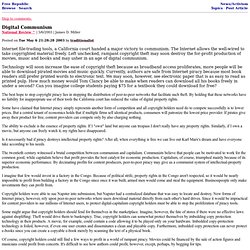
Digital Communism National Review ^ | 5/6/2003 | James D. Miller Posted on Tue May 6 21:28:28 2003 by traditionalist Internet file-trading tools, a California court handed a major victory to communism. Radical Plural Democracy and the Internet. Radical Plural Democracy and the Internet Professor Margaret Chon, Seattle University School of Law The Internet is often celebrated as a new social space in which significant social attributes such as sex or race are muted or even non-existent.
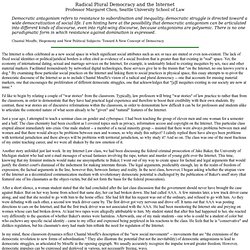
The lack of fixed social identities or political/juridical borders is often cited as evidence of a social freedom that is greater than that existing in "real" space. Radical Democracy and the Internet: Interrogating Theory and Practice. Will the global NSA backlash break the internet? The NSA's ongoing surveillance has spurred many governments to pursue stronger data-protection laws, but there are growing concerns that this backlash could divide the internet along national borders, threatening the principles of openness and fluidity that it was founded upon.

In September, Brazil announced plans to build a fiber-optic cable that would route internet traffic away from US servers, theoretically keeping its citizens’ data away from the NSA. The policy has yet to be implemented, and many question whether it will actually be effective, but others appear to be following Brazil’s lead. In Germany, telecommunications companies are working to create encrypted email and internet services that would keep user data within the country's borders, and Switzerland's Swisscom has begun building a domestic cloud-service to attract companies that may have grown leery of American spying. Can We All Just Admit Google Is An Evil Empire? ⚙ Co. Google is kicking off 2014 with some good old-fashioned privacy infringement.
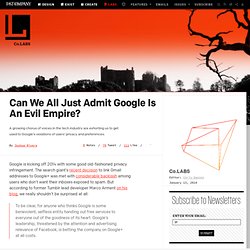
The search giant’s recent decision to link Gmail addresses to Google+ was met with considerable backlash among users who don't want their inboxes exposed to spam. The Digital Surplus and Its Enemies. Magazine. Mute Vol. 3, No. 4 - Slave to the Algorithm Buy on Amazon US $9.99 | UK £9.99 | DE €9.99 and other regions, Super Saving free shipping.
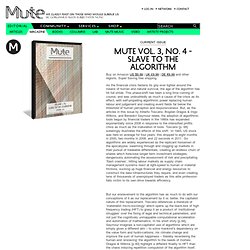
As the financial crisis fastens its grip ever tighter around the means of human and natural survival, the age of the algorithm has hit full stride. Mute Vol 2, No. 0 − Precarious Reader. Cheap Chinese John Barker on the perilous and exploitative employment of economic migrants essential to capitalist productivity today.
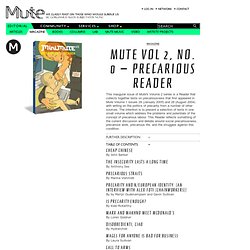
Facebook 'dead and buried to teens', research finds. Facebook is 'dead and buried' to older teenagers, an extensive European study has found, as the key age group moves on to Twitter, Instagram, WhatsApp and Snapchat.
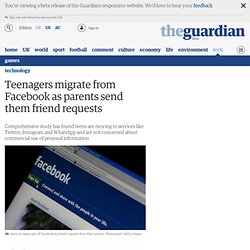
Researching the Facebook use of 16-18 year olds in eight EU countries, the Global Social Media Impact Study found that as parents and older users saturate Facebook, its younger users are shifting to alternative platforms. "Facebook is not just on the slide - it is basically dead and buried," wrote Daniel Miller, lead anthropologist on the research team, who is professor of material culture of University College London. MyBrain.net - Geert Lovink The colonization of real-time and other trends in Web 2.0. The neurological turn in recent web criticism exploits "the obsession with anything related to the mind, brain and consciousness".

Geert Lovink turns the discussion to the politics of network architecture, exploring connections between the colonization of real-time and the rise of the national web. "Sociality is the capacity of being several things at once. " G. H. Chapter 9. Victory. Reed, John. 1922. Ten Days That Shook the World. Watch Alain Badiou Explain Money. Culture and admin. Béatrice Hibou, La bureaucratisation du monde à l’ère néolibérale, La Découverte, Paris, 2012. 223 pp., €17.00 pb., 978 2 70717 439 0.
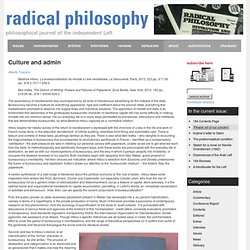
Ben Kafka, The Demon of Writing: Powers and Failures of Paperwork, Zone Books, New York, 2012. 182 pp., £19.95 hb., 978 1 93540 826 0. RSA Animate - The Internet in Society: Empowering or Censoring Citizens? Slavoj Zizek - A New Kind of Communism. Digital Labor: The Internet as Playground and Factory: Amazon.co.uk: Trebor Scholz. Labor" schulz download&source=web&cd=5&ved=0CEwQFjAE&url=http%3A%2F%2Fwww.triple-c.at%2Findex.php%2FtripleC%2Farticle%2Fdownload%2F277%2F368&ei=CMk4UomfEMiqhQfUk4DgAw&usg=AFQjCNHNxM-DCeeuy1V5VMl-nZzoZ. Vol 11, No 2 (2013) Vol 11, No 2 (2013)